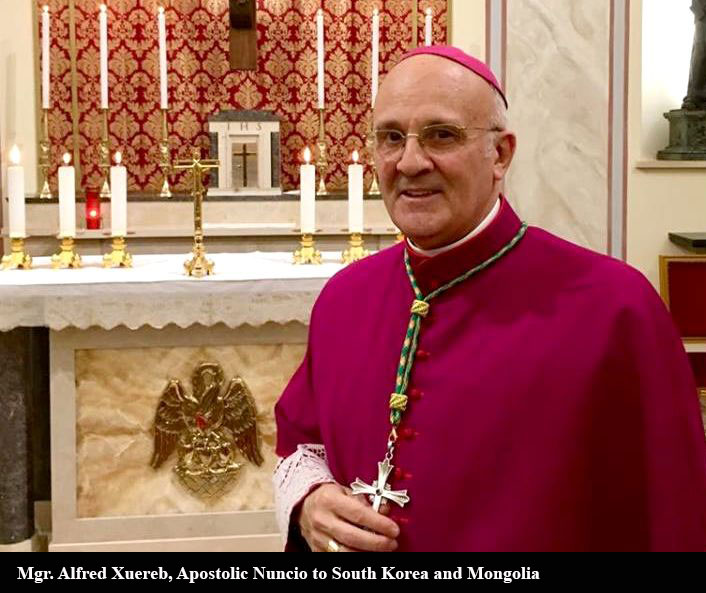KOREA
Nuncio hopes the historic agreement is the beginning of a long, arduous road towards peace
On 12 June, Singapore hosted a historic summit meeting between US president Donald Trump and North Korean leader Kim Jong-un, which initiated a new round of negotiations. Long-time enemies appeared to be reconciled as the two determined leaders shook hands and said that they will not fight any longer but establish a good relationship and fulfil their obligations.
This reconciliation is a great achievement which has been described as a “milestone” event that will leave a mark in history. The central concrete result of the summit was the launching of a full-scale diplomatic dialogue. There are many hurdles to overcome, but at least while talks are ongoing the guns on both sides will remain silent.
The Apostolic Nuncio to Korea and Mongolia, Archbishop Alfred Xuereb, hailed the summit as “truly historic”, describing it as “marking an important page at the beginning of a long and arduous road” towards peace. He said the Church is “full of hope and confidence” but warned that it was the beginning of a long process.
The successful summit brings renewed hope that the declaration of an end to the Korean War by the two leaders and South Korean President Moon Jae-in may be in sight. At a news conference shortly after the summit, Trump clearly stated that a declaration of the war’s end would be coming “soon”, while President Moon declared that the parties would “put the dark times of war and conflict behind us and a write a new history of peace and cooperation.” However, it remains unclear when or how a declaration of the war’s end by the US, North and South Korea will happen.”
Archbishop Xuereb commented: “We are hopeful because this beginning was very positive, very good” and we’ve moved from rhetoric and words like “fire and fury” and “the complete devastation of North Korea” to more conciliatory words that speak about peace.
In addition to the terms of the comprehensive joint statement agreed upon by Trump and Kim on 12 June, the peace process also appears likely to be tied to the pace of specific measures to implement full denuclearization of the Korean peninsula and guarantees on the North Korean regime’s security, including the dismantlement of a missile engine testing site as discussed by the two leaders. In his dialogue with Kim, Trump mentioned both human rights and the kidnapped Japanese. He confirmed that the parties would seek to create a peaceful regime involving South Korea and China, so hopefully, these two countries will also work towards establishing peace and not undermine the results of the summit.
Xuereb said the Church in Korea is living these events “with great faith” and said the Catholic Cathedral in Seoul has been holding special prayers for peace and reconciliation every Tuesday. The Catholic Bishops of Korea have also proposed a novena from the 17th to the 25th of June to pray for peace, reconciliation, and unity on the Korean peninsula.
Following the historic summit and the more conciliatory climate it engendered, Xuereb said the Church is praying for the evangelisation of North Korea. “The Holy See wishes to offer its support to any initiative in favour of dialogue and reconciliation and also to take advantage of this to bring the Good News of Jesus Christ to North Korea,” he said.
During an address at St Peter’s Square on Sunday, Pope Francis also praised the agreement for the total denuclearisation of the Korean peninsula reached at the inter-Korean summit last Friday between North Korean leader Kim Jong-un and South Korean president Moon Jae-in.
“I add my prayers to the positive result of Friday’s inter-Korean summit and the brave commitment by the leaders of the two parties to push for a process of sincere dialogue for a Korean peninsula free of nuclear weapons,” Francis said.
He urged the two Korean countries to continue to collaborate:”I pray to the Lord so that the hope of a future of peace and fraternal friendship does not disappoint, and that the collaboration may go on to bear fruit for the beloved Korean people and the entire world.”





